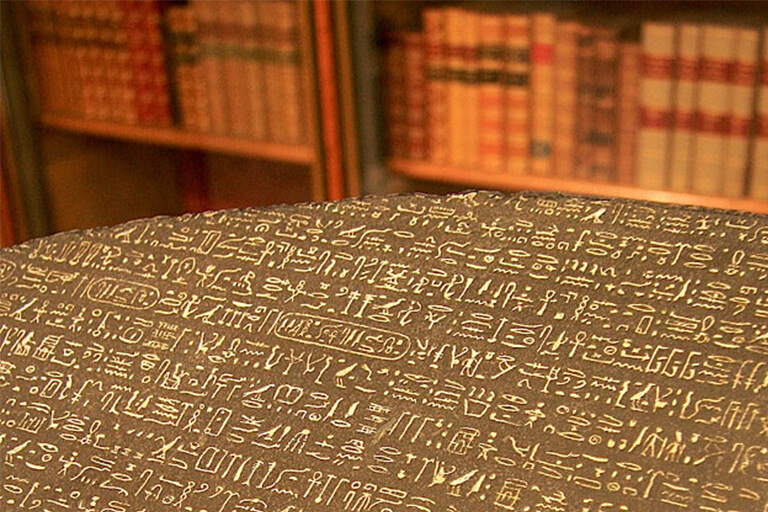Muslim Voices — Language

Audio transcript:
0:00:05:>>ROSEMARY PENNINGTON: Welcome to Muslim Voices. I'm your host, Rosemary Pennington. For years we've been hearing how important it is children be exposed to other languages. Children who are introduced to foreign languages early have a much easier time learning them as they get older. Also that early exposure can take away some of the mystique that often surrounds language acquisition.
0:00:35:>>UNIDENTIFIED PERSON: (Speaking Arabic).
0:00:35:>>ROSEMARY PENNINGTON: In Bloomington Indiana, a program is introducing young children to Arabic. The hope is that it will not only make the kids more comfortable with that language but also that it will bring Muslim and non-Muslim community members together. It's a typical Saturday morning at the Monroe County Public Library. There are people roaming the stacks, teenagers at computers and a long line at checkout. And it's no less busy inside the preschool education center. The patrons are just smaller. In the room, children under the age of 7 can play house, build towers with wooden blocks or read. In one corner, though, sits a circle of kids doing something completely different.
0:01:20:>>UNIDENTIFIED PERSON: (Speaking Arabic).
0:01:21:>>ROSEMARY PENNINGTON: They're learning Arabic.
0:01:23:>>UNIDENTIFIED PERSON: (Speaking Arabic).
0:01:26:>>ROSEMARY PENNINGTON: These children are taking part in Alif Baa. It's a joint program of the library and Indiana University's Center for the Study of Global Change. The goal is to introduce kids to the language as well as the culture of Arabic speakers.
0:01:41:>>NAOMI SPECTOR: For me, at this age what we want - what I want to do is first it's basic exposure.
0:01:47:>>ROSEMARY PENNINGTON: Naomi Spector coordinates Alif Baa as well as its parent program Bridges Children Languages World for the Global Center.
0:01:55:>>NAOMI SPECTOR: What I would like to do is to be able to expose a child to these basic sounds and sights with the idea that if at some point they should continue their education, if at some point they even want to do a different language, it won't seem so frightening to them.
0:02:12:>>ROSEMARY PENNINGTON: Joshua Wolf heads the library's children's department. He says library patrons are typically amazed when they see Alif Baa flyers and realize it's just something they can show up for.
0:02:24:>>JOSHUA WOLF: You know we're always looking for a more attractive way to bring people into the library and to create a new experience. And yeah, my God, to be able to offer something like this - I've worked in four other public libraries and none of them had the resources that Bloomington has. So to be able to offer something like this to non-Arabic speakers or people completely without an Arabic background or any sort of Arabic at all is just amazing.
0:02:51:>>SARA BUKHARI: Simon says stomp your feet.
0:02:52:>>ROSEMARY PENNINGTON: Alif Baa takes place most Saturdays during IU's academic year. During the drop-in program, instructors who are IU students lead the kids in counting, sing-a-longs and games. Sara Bukhari is a former team leader of Alif Baa. Her family's from Saudi Arabia, and she's spoken Arabic all her life. She says teaching the language has become a passion for her. Her approach to teaching Arabic to children is to make it as fun and engaging as possible.
0:03:25:>>SARA BUKHARI: I find that if I just sit down and teach them actually without making it fun they don't really - I'll lose a bunch of them. Some of them will stay. A lot of them are Arab so they do - (laughter) their parents make them. So we just try to make it fun. Like if we play games and just have Arabic words and the alphabet games and stuff, then they'll stay and have fun.
0:03:46:>>UNIDENTIFIED PERSON: We're going to play Hot Potato. We need lots of volunteers though.
0:03:48:>>ROSEMARY PENNINGTON: The crowd is a mix. There are non-Arabic speakers who seem to have just stumbled into Alif Baa. Then there are the regulars, several of whom are from households where Arabic is spoken alongside English.
0:04:00:>>IRANIA NOUFAL: Arabic is my first language so - but English is their first language.
0:04:05:>>ROSEMARY PENNINGTON: Irania Noufal is Muslim and is from Palestine. She and her husband are both native Arabic speakers, but they worry their kids aren't getting enough exposure to the language at home. So Noufal brings them to Alif Baa.
0:04:18:>>IRANIA NOUFAL: I always wanted them to be bilingual and you know keeping the traditions and the language at home is an important part for me. And you know I'm trying to make it fun for them as well, so that's why I bring them here.
0:04:33:>>ROSEMARY PENNINGTON: Both Wolf and Specter say they hope the mix of native and non-native speakers, of Muslim and non-Muslim, will help build bridges between the communities.
0:04:42:>>NAOMI SPECTOR: I thought that this is a way to sort of provide people - everyone in the community an opportunity to meet each other.
0:04:49:>>JOSHUA WOLF: Monroe County is a very diverse community and particularly for Indiana. And we always felt like we have a mandate to reflect that diversity, you know, and to reach out to all the different sort of micro communities that exist here. So it fell right in line with that mission you know from day one.
0:05:06:>>SARA BUKHARI: (Singing in Arabic).
0:05:15:>>ROSEMARY PENNINGTON: The reaction of the Monroe County Community to Alif Baa has been overwhelmingly positive and has encouraged the library and Bridges to begin exploring what other languages they can offer the public. And they've since launched a Chinese language program called Ya-Ya.
0:05:31:>>SARA BUKHARI: (Singing in Arabic).
0:05:39:>>ROSEMARY PENNINGTON: This has been Muslim Voices, a production of the Voices and Visions project in partnership with WFIU public media from Indiana University. Support comes from the Social Science Research Council. Music was provided by Animus. You can find us on Twitter and Facebook as well as iTunes. There's also a blog at muslimvoices.org.


 IU Global
IU Global